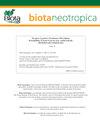Research in education and communication in science: contributions from the Biota-Fapesp program to biodiversity education
IF 1.2
4区 环境科学与生态学
Q3 BIODIVERSITY CONSERVATION
引用次数: 1
Abstract
Abstract In this article, we aim to understand the contributions of the Biota-Fapesp Program to the research in biodiversity education and communication. Our research questions are: (i) is the Biota-Fapesp Program following or contributing to the significant advances in conceptual, technological/methodological, and management/governance aspects of biodiversity education/communication research?; (ii) if yes, how do the projects contribute to these advances?; and (iii) what are the main expectations for the future of Biota in education and communication research? Our analyzes highlighted a qualitative contribution from the Biota-Fapesp Program at institutional, methodological, conceptual, and educational levels. However, due to the few projects, it can be considered a summative contribution and not a transformative one. Perspectives for the Biota-Fapesp Program in these areas were divided into three approaches: 1. Research lines and concepts that could be encouraged through specific calls or inclusion in other calls of interest to the Program; 2. Innovative methodological approaches for the area that should be encouraged; 3. Suggestions for scientific research management and infrastructure. Through data and discussions presented below, we hope to contribute to the understanding of the role of Biota-Fapesp in the area, and point out ways to develop research, practices and public policies that promote the strengthening of science as culture.科学教育与传播研究:Biota-Fapesp项目对生物多样性教育的贡献
摘要本文旨在了解Biota-Fapesp项目在生物多样性教育与传播研究中的贡献。我们的研究问题是:(i) Biota-Fapesp项目是否遵循或促进了生物多样性教育/传播研究在概念、技术/方法和管理/治理方面的重大进展?(ii)如果是,这些项目如何促进这些进步?(iii)对Biota未来在教育和传播研究方面的主要期望是什么?我们的分析强调了Biota-Fapesp项目在制度、方法、概念和教育层面的定性贡献。然而,由于项目很少,它可以被认为是总结性的贡献,而不是变革性的贡献。Biota-Fapesp项目在这些领域的前景分为三种:1。可通过具体呼吁或纳入项目感兴趣的其他呼吁来鼓励的研究路线和概念;2. 应鼓励在该领域采用创新的方法;3.科研管理和基础设施建设建议。通过下面提供的数据和讨论,我们希望有助于理解Biota-Fapesp在该领域的作用,并指出发展研究、实践和公共政策的方法,以促进加强科学作为文化。
本文章由计算机程序翻译,如有差异,请以英文原文为准。
求助全文
约1分钟内获得全文
求助全文
来源期刊

Biota Neotropica
BIODIVERSITY CONSERVATION-
CiteScore
2.90
自引率
16.70%
发文量
0
审稿时长
4-8 weeks
期刊介绍:
BIOTA NEOTROPICA is an electronic, peer-reviewed journal edited by the Program BIOTA/FAPESP: The Virtual Institute of Biodiversity. This journal"s aim is to disseminate the results of original research work, associated or not to the program, concerned with characterization, conservation and sustainable use of biodiversity within the Neotropical region.
Manuscripts are considered on the understanding that their content has not appeared, or will not be submitted, elsewhere in substantially the same form, because once published their copyrights are transferred to BIOTA NEOTROPICA as established in the Copyright Transfer Agreement signed by the author(s).
 求助内容:
求助内容: 应助结果提醒方式:
应助结果提醒方式:


